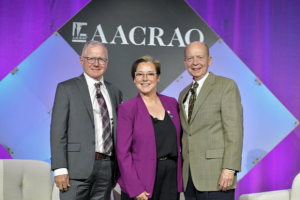
By Autumn Walden, Editor, AACRAO Connect, Content Strategy Manager, AACRAO
“I never thought I would see a day when FERPA was trending on TikTok,” said Melanie Gottlieb, AACRAO Executive Director, as she sat down to kick off the FERPA Fireside Chat.
When it comes to crowd-pleasers at the AACRAO Annual Meeting, few topics command the same loyal following as FERPA. This year’s FERPA fireside chat was no exception, drawing an overflow audience of nearly all 1,700 conference attendees eager to hear from the experts. Moderated by AACRAO Executive Director Melanie Gottlieb, the session featured longtime FERPA leader LeRoy Rooker and newly appointed Senior Fellow Dale King, who brought deep federal policy experience and a dose of FERPA-flavored humor.
“I don't know whether to be thrilled or scared. There are over a thousand people in this auditorium to hear about FERPA,” King joked as he looked out over the crowd. “I discovered I’m a FERPA addict. And there’s no 12-step program, so I decided to come to the source of my addiction—AACRAO.”
The session served as both a welcome for King, who previously led the U.S. Department of Education’s Student Privacy Policy Office, and a tribute to Rooker, who directed the department’s Family Policy Compliance Office for over two decades and now holds the title of Senior Fellow Emeritus.
Gottlieb opened the conversation by acknowledging the legacy Rooker built and the trust he cultivated among AACRAO members. “Leroy is the man, the legend—and for those lucky few, the bobblehead,” she quipped.
The conversation quickly turned to pressing privacy concerns facing higher education professionals today. King shared a sweeping overview of his journey from a special education teacher in 1974—the year FERPA was enacted—to becoming one of its foremost interpreters at the federal level. His experience reinforced the law’s enduring complexity and relevance, particularly for institutions that manage sensitive records across diverse student populations.
King and Rooker underscored how evolving technology and external pressures challenge FERPA’s boundaries. Among the top concerns raised during the session were:
Third-party data sharing: With the widespread use of educational technology vendors and cloud-based platforms, institutions often struggle to ensure that student data is handled appropriately. Transparency is key, as many students and parents don’t fully understand how their data is used, or who has access to it.
The definition of an education record: A persistent question, especially in light of the 2002 Supreme Court case Owasso v. Falvo, which included dicta suggesting that only records maintained in a central location might be covered under FERPA. “If that doesn’t send off alarm bells, you don’t understand FERPA,” Rooker warned. He and King advocated reinforcing the broad statutory definition to avoid undermining privacy protections.
Emerging technologies and AI: As institutions integrate AI tools into learning environments, questions about what constitutes an education record—and how such data is generated and stored—are becoming more urgent. “We talk about disclosure of information. They're creating information,” King said.
FERPA and ICE: If ICE shows up and wants access to information, you cannot disclose information to ICE without a subpoena. If they show up with a subpoena, then you are required to use reasonable efforts to notify the individual prior to complying with that subpoena, unless a court specifically states that you are not to disclose to the individual prior to compliance. Reach out to your legal team, that's always got to be your first step, and work with them to make sure. You need to work with your legal staff to determine how best to address it or whether you should address it.
The conversation also touched on recent federal developments. King highlighted a renewed emphasis on proactive FERPA enforcement, citing the Department of Education’s decision to initiate investigations even without formal complaints. “The Student Privacy Policy Office isn’t going anywhere,” he said, noting that two states—California and Maine—are currently under scrutiny.
As always, attendees came prepared with detailed questions:
- One audience member asked whether emails count as education records only when printed and placed in a student’s file. “That logic… makes no sense at all,” Rooker said. “If an email isn’t an education record unless it’s printed out and put in a folder, then your student information system isn’t an education record either unless it’s printed and filed. It’s illogical and very dangerous.”
- Another asked about the heaviest penalties imposed for FERPA violations. King and Rooker noted that the Department of Education’s enforcement approach emphasizes voluntary compliance, and financial penalties are rare. “Institutions want to be in compliance,” Rooker said. “They’re not looking for ways around FERPA—they’re looking for ways to do it right.”
- One attendee asked about the possibility of automatic parental rights. King and Rooker responded that giving parents automatic access to postsecondary student records would require statutory change, which they didn’t believe was likely to succeed.
- Another participant asked how to handle faculty posting classroom photos to social media. “That’s a problem under FERPA,” Rooker said, especially if the instructor—not the students—is the one sharing the images.
- Several audience members asked about the possibility of a private right of action, in which students could sue institutions directly for FERPA violations. “That would require an amendment to the statute,” King explained. “I don't think that would fly at all.”
- And while some viral TikTok videos have promoted the idea that students can get their loans forgiven due to FERPA violations, Rooker quickly shut that down.
Despite the complexity of the issues, the session maintained a tone of camaraderie and shared purpose. As the fireside chat closed, Gottlieb invited attendees to seek out the panelists with their remaining questions. “FERPA is in safe hands with our AACRAO community,” she said.